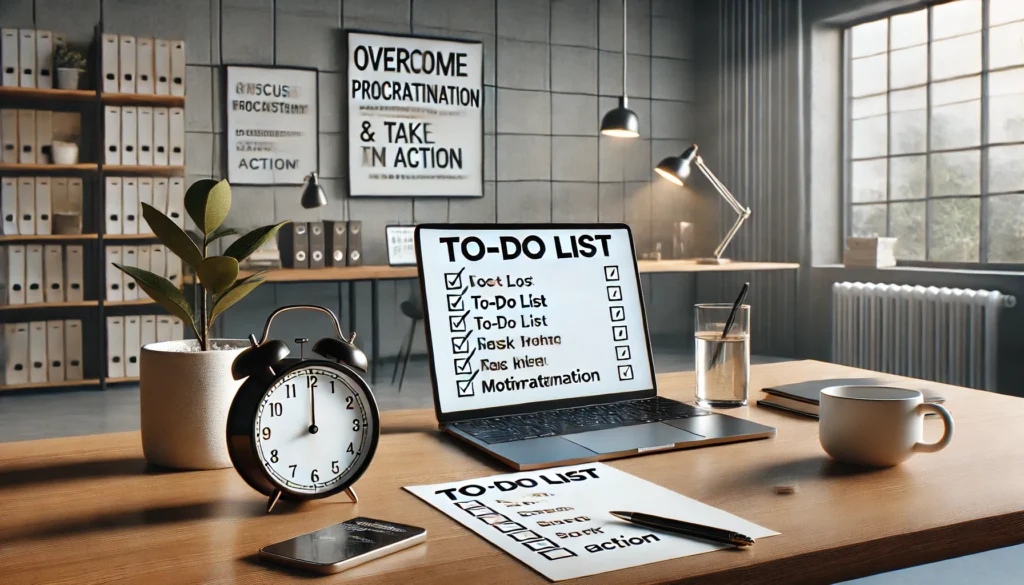How to Overcome Procrastination and Take Action Now
Procrastination is a common struggle for many people, especially when it comes to tackling big tasks, starting new projects, or taking the first step toward achieving goals. While it’s natural to feel hesitant or overwhelmed, procrastination can delay progress and hinder success. Fortunately, there are effective strategies you can use to overcome procrastination and take action right now. In this article, we will explore practical techniques to help you break free from procrastination and stay productive.
1. Understand the Root Cause of Procrastination
Before you can effectively overcome procrastination, it’s important to understand why you procrastinate in the first place. Procrastination often stems from fear, perfectionism, lack of motivation, or feeling overwhelmed by a task. Identifying the root cause can help you address the issue and take the necessary steps to move forward.
Common Causes of Procrastination:
- Fear of Failure: You might avoid starting a task because you’re afraid of not doing it perfectly.
- Perfectionism: You may procrastinate because you want everything to be perfect before you begin, which leads to hesitation.
- Overwhelm: Large tasks or projects can seem too big to tackle, making it easier to delay starting.
- Lack of Motivation: Sometimes, procrastination occurs when the task feels uninspiring or lacks clear goals.
By recognizing why you procrastinate, you can take specific actions to address those issues and overcome the barrier that’s keeping you from taking action.
2. Break Tasks Into Smaller, Manageable Steps
One of the most common reasons for procrastination is feeling overwhelmed by the size or complexity of a task. Large projects can feel daunting, making it tempting to put them off. Breaking the task into smaller, more manageable steps can make it easier to get started and create momentum.
How to Break Tasks Down:
- Create Actionable Subtasks: Instead of saying, “Write the report,” break it down into smaller steps like “Outline the report,” “Write the introduction,” and “Draft the conclusion.”
- Set Micro-Goals: Focus on achieving small, daily goals, rather than the entire project at once.
- Celebrate Small Wins: Each time you complete a subtask, take a moment to acknowledge your progress. This helps build momentum.
By breaking tasks into smaller, actionable steps, you make the work feel less overwhelming and easier to start.
3. Use the 5-Minute Rule
The 5-minute rule is a simple technique that can help you overcome procrastination by focusing on just getting started. The idea is to commit to working on a task for just five minutes. Often, the hardest part is simply starting, and once you begin, you may find that you want to continue working.
How to Apply the 5-Minute Rule:
- Set a Timer for 5 Minutes: Tell yourself that you’ll work on a task for just five minutes. The small time commitment makes it feel less intimidating.
- Commit to Starting: Focus only on starting the task and don’t worry about how long you’ll work. After five minutes, you can stop if you need to.
- Keep Going if You Want: Once you begin, you may feel more motivated to continue working on the task.
The 5-minute rule works by breaking the initial barrier of starting, which is often where procrastination occurs.
4. Eliminate Distractions
Distractions are one of the biggest obstacles to productivity. Whether it’s your phone, social media, or environmental noise, distractions can make it difficult to focus and get started on a task. To overcome procrastination, it’s essential to create an environment that minimizes distractions and allows you to focus.
How to Eliminate Distractions:
- Turn Off Notifications: Put your phone on silent or use apps that block distracting websites during work time.
- Create a Focused Workspace: Set up a workspace that’s free from distractions like clutter, noise, or interruptions.
- Set Boundaries: If possible, let others know when you’re in focus mode and can’t be interrupted.
Eliminating distractions helps you create a productive environment where you can focus on the task at hand without being sidetracked.
5. Focus on the “Why” Behind Your Task
Sometimes, procrastination occurs because we don’t see the value in a task or we’re disconnected from the reasons why it’s important. Focusing on the bigger picture and understanding why the task matters can reignite motivation and help you take action.
How to Focus on the “Why”:
- Visualize the Benefits: Think about how completing the task will benefit you or bring you closer to your goals.
- Connect the Task to Your Values: Align the task with your personal values and long-term objectives to make it feel more meaningful.
- Create a “Why” Statement: Write down why this task matters and how it will contribute to your success.
By focusing on the “why,” you make the task feel more purposeful, which can help push you past procrastination.
6. Use Deadlines to Create a Sense of Urgency
Deadlines are a powerful tool for overcoming procrastination. They create a sense of urgency and help you stay focused on the task at hand. Even if you’re not working on a project with a strict deadline, creating your own deadlines can help you stay on track and avoid unnecessary delays.
How to Use Deadlines Effectively:
- Set Realistic Deadlines: Create deadlines for specific tasks and ensure they’re achievable within the timeframe.
- Break Projects into Smaller Deadlines: For larger projects, set deadlines for individual tasks or milestones.
- Use Accountability: Share your deadlines with someone else to hold yourself accountable.
By setting deadlines, you create a sense of urgency that drives you to take action and stay focused on completing the task.
7. Practice Self-Compassion
It’s easy to be hard on yourself when you procrastinate, but self-criticism can lead to guilt, anxiety, and more procrastination. Practicing self-compassion allows you to approach procrastination with kindness and understanding, which helps you take action without feeling overwhelmed or ashamed.
How to Practice Self-Compassion:
- Be Kind to Yourself: Recognize that procrastination is a common issue and avoid harsh self-judgment.
- Acknowledge Your Progress: Focus on the progress you’ve made, even if it’s small, instead of dwelling on what’s left to do.
- Forgive Yourself: If you slip into procrastination, forgive yourself and refocus on moving forward.
Self-compassion allows you to overcome procrastination with a positive mindset and encourages you to take consistent action.
Conclusion: Take Action Now and Overcome Procrastination
Procrastination doesn’t have to control your productivity. By understanding its causes, breaking tasks into smaller steps, using techniques like the 5-minute rule, and eliminating distractions, you can overcome procrastination and take action now. Remember, the key is to start—once you begin, momentum builds, and tasks become more manageable. With a little effort and self-compassion, you can break free from procrastination and achieve your goals.


